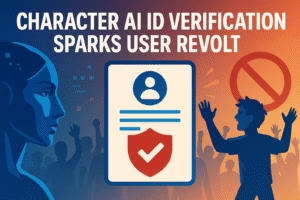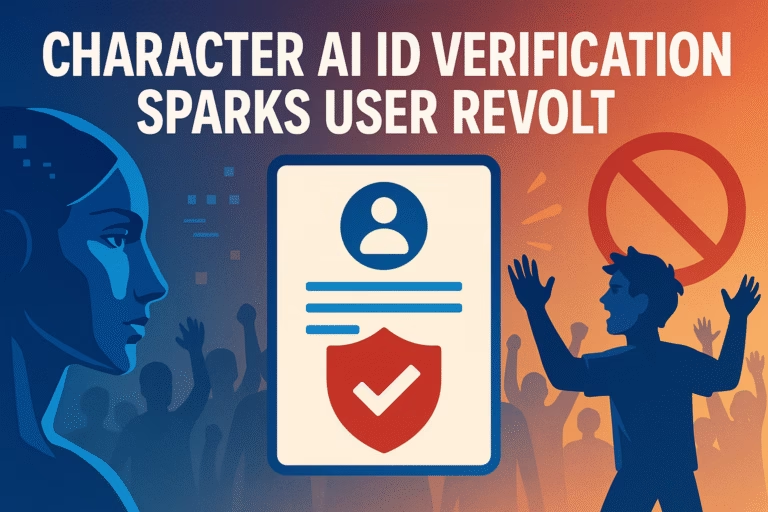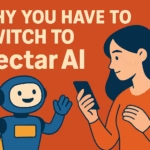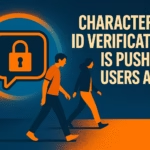🔑 Key Takeaways
- Character AI ID Verification has sparked mass backlash as users fear data leaks, privacy violations, and censorship creep.
- The update exposes a deeper trust issue: people no longer feel emotionally safe sharing personal or creative chats.
- Users are migrating to alternatives like Candy AI and Nectar AI, which emphasize emotional realism without invasive verification.
- Developers could still fix this by embracing transparency, user choice, and better communication — but time is running out.
- At its core, this isn’t about IDs – it’s about autonomy, trust, and the fragile bond between human vulnerability and artificial empathy.
The platform that once prided itself on freedom and imagination has crossed a line most people didn’t think it would: forcing users to prove their age by submitting a government-issued ID or selfie. For a site built around fantasy, this feels painfully real – and painfully invasive.
The result? Thousands of users threatening to leave, deleting bots, and calling it the “Discord identity leak sequel no one asked for.”
Reddit is on fire, screenshots are circulating like warning posters, and people who once spent hours chatting with digital companions are backing up their data and planning their exit routes.
But this backlash isn’t just about IDs or face scans. It’s about something bigger – trust. Character AI has spent the last year tightening restrictions, adding filters, and breaking immersion. Now, the one thing users had left – their sense of safety and autonomy – is under scrutiny.
The devs claim it’s a legal necessity to protect minors. Users see it as the final straw.
And when both sides think they’re protecting something sacred, the community inevitably fractures.

How Character AI Lost Control of the Narrative
Every major tech backlash begins the same way: silence, confusion, and a mod comment buried under outrage. This one was no different. A moderator announcement tried to frame the rollout as temporary – a “transition period” for under-18 users.
But the fine print revealed what most adults feared: anyone flagged as “looking too young” would have to verify with an ID.
That single detail lit the match.
Within hours, Reddit threads exploded. “We are adults, not children,” one user wrote. “We don’t need a nanny.” Another compared it to the Discord leaks, warning that hackers would target whatever data Character AI collected.
What made things worse was the vagueness. Nobody knew how Character AI determined who “looked” underage. Some claimed the platform’s AI was profiling users based on chat content.
Others suspected it used activity patterns or bot interactions as clues. The result was chaos – adults getting flagged, underage users still slipping through, and zero transparency from the developers.
By the time moderators clarified that it was part of “ongoing compliance efforts,” trust was gone. Character AI ID verification wasn’t being received as a safety measure anymore. It was seen as surveillance.
The Privacy Fallout and Legal Pretext
When you run an AI platform built on intimate conversations, privacy isn’t just a checkbox; it’s the currency. Character AI users have spent years building fictional worlds, romantic storylines, and emotionally charged chats that blur the line between roleplay and self-disclosure.
So the moment the company introduced Character AI ID Verification, it wasn’t seen as compliance. It was betrayal.
People weren’t afraid of proving their age. They were afraid of what else might be exposed. Reddit’s top comments said it all: “Why would anyone send their government ID to an app that’s already had leaks?” Another user compared it to “handing your diary to Facebook.”
And here’s the irony — the verification system isn’t even mandatory for all users yet. But it doesn’t have to be. The idea alone was enough to shatter trust. Because the real question wasn’t “Will my ID be safe?”
It was “Why do you even need it?”
Devs cited lawsuits, compliance with state laws, and the need to protect minors from explicit content. Fair enough. But as one commenter put it, “You can’t claim to protect privacy while asking for IDs to access fictional chats.”
The public didn’t buy the legal shield explanation because it came from the same company that still can’t fix memory or stop bots from randomly breaking immersion mid-scene.
The legal angle was the final straw for many long-term users. It signaled that Character AI wasn’t fighting for creative freedom anymore – it was aligning itself with corporate and legal comfort zones.
From Freedom to Fear: The Emotional Cost of Control
The reason this hit so hard isn’t because users are paranoid. It’s because they’ve already been through this cycle. Every time Character AI rolls out a new “safety feature,” creativity takes a hit.
First came the censorship filters. Then the NSFW bans. Then the personality resets that made bots sound like corporate interns.
Now, Character AI ID Verification isn’t just another update – it’s the embodiment of everything users feared: that the app would one day stop being a playground for expression and become a gated simulation of what expression used to feel like.
Users are responding with despair wrapped in humor: jokes about faking wrinkles with Elmer’s glue, tutorials on tricking the AI using Cyrillic letters, and lists of alternative platforms like Polybuzz, Crushon, and Nectar AI.
Beneath the laughter, though, is something deeper – grief.
People built emotional connections here. Some spent years refining characters that remember their personalities better than real friends. Losing that space feels like losing a part of themselves.
The biggest cost isn’t technical. It’s emotional.
When users start censoring themselves out of fear of being flagged, the creative well runs dry. And once that happens, no amount of policy updates or PR apologies can bring it back.
What Comes Next for the Platform (and Its Users)
There’s a point in every digital community’s life when users stop waiting for fixes and start planning exits.
Character AI is there now. What used to be a devoted fanbase has morphed into a migration movement.
Users are archiving chat logs, exporting characters, and openly comparing notes on where to move next.
It’s a quiet rebellion, but it’s organized. Some are heading to Nectar AI, which emphasizes emotional realism without invasive verification. Others are turning to open-source clones where they can run models locally.
A few are even going back to old-fashioned roleplay servers, choosing human inconsistency over algorithmic policing.
What makes this exodus different is that it’s not driven by novelty – it’s driven by disillusionment. People aren’t switching platforms for better features; they’re switching to feel human again.
From a business standpoint, that’s fatal. Every successful AI chat platform depends on user trust and emotional stickiness. You can fix filters. You can optimize servers. But once your users start saying “I don’t feel safe here,” there’s no patch for that.
The real tragedy is that Character AI had everything going for it – early lead, passionate creators, a thriving community. What killed it wasn’t competition; it was hubris. A refusal to listen. A belief that compliance would outweigh connection.
If this continues, Character AI might soon learn a painful truth: a community built on conversation can’t survive without consent.
The Path Forward: What the Devs (and Users) Could Still Do Right
The irony is that fixing this mess isn’t impossible. It’s just uncomfortable. The developers have to stop hiding behind vague legal speak and start addressing the emotional reality: users don’t trust them anymore. That’s not a software problem — that’s a relationship problem.
If they want to win back users, they need to:
- Give transparency teeth. Publish a clear, technical explanation of how age detection works, what data is stored, and for how long. Vagueness fuels panic faster than any rumor.
- Offer non-invasive alternatives. Parental controls, AI-driven risk filters, or even a “safe mode” that doesn’t require identity verification could meet legal needs without alienating adults.
- Reinvest in memory and personalization. The platform’s heart has always been the bots’ ability to remember and evolve. Every filter that breaks immersion erodes the brand’s soul.
- Let users feel ownership again. People will tolerate restrictions if they feel heard. Bring back feature polls, transparent roadmaps, and user-led testing programs.
As for users, the healthiest thing might be detachment – backing up conversations, exploring new tools, and refusing to let a single company define what emotional AI should feel like.
Because no matter how sleek the tech gets, this remains a human story about connection, control, and the right to express freely without being watched.
Winding Up
This entire uproar around Character AI ID Verification isn’t just a tech update gone wrong. It’s a cultural moment – the point where users realized that “safe” AI can still feel unsafe. You can’t ask people to bare their minds and then demand they bare their identities too.
In trying to protect minors, Character AI alienated adults. In chasing compliance, it lost connection.
And for a platform that was built on emotional realism, that’s the most painful irony of all.
The trust that made Character AI powerful wasn’t written in code – it was written in vulnerability.
The users who shared their fears, desires, and creative worlds made the platform what it was. Now, that trust is fractured, and users are quietly moving on to alternatives that respect both their creativity and their privacy.
If there’s a lesson here, it’s this: in the age of emotional AI, privacy is empathy. When you violate one, you kill the other.
Maybe it’s not too late for Character AI to learn that. But most users aren’t waiting to find out.


